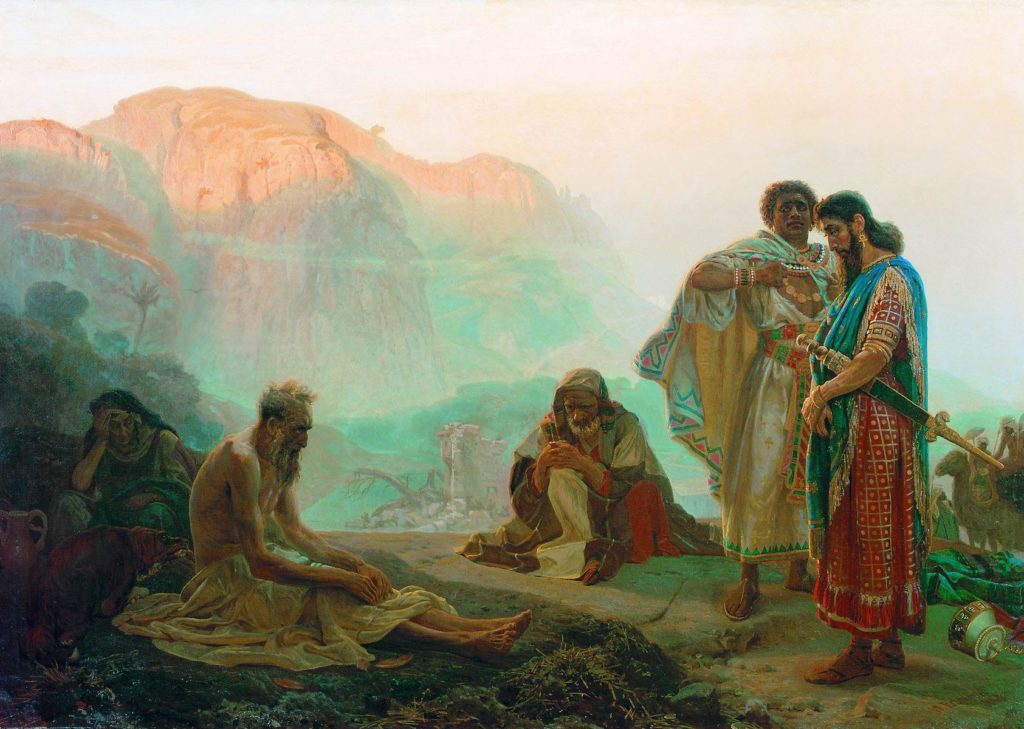The Au Sable Institute launched a Facebook group recently for people like you and me who believe God’s earth matters. Corinne Hoffman shared some thoughts about Job there that caught my attention. When I asked her if she’d expand her comments for this blog, she kindly agreed. Her sincerity and devoutness shine through her words. Her faith, as you’ll see by the end, naturally leads her to cherish God’s Creation out of humility. It is this kind of humility, I believe, that should shape our hearts and minds when we think of our unique position in Creation. Over time, I’d like to share the voices of others here as well.
(One quick note about Job. I’d enourage you to check out The Bible Project’s three podcasts about the book. They’re very insightful. The last podcast of the three highlights something I had not noticed before. God does not restore Job’s health and fortunes until after he has prayed for his three friends and their errors. The podcast insightfully explores the significance of that.)
The book of Job has a crazy story to share.
Not only does this book of the Bible give us clues on how to deal with suffering, but it demonstrates who is at the center of it all. And it’s not you and me.
Humility as a Christian has been hard for me to truly grasp and demonstrate.
The opposite of humility is being boastful. But you could, in an effort to be humble, tell yourself that you’re no good or be overly worried about being portrayed as being better than those around you. At a certain point, it can become unhealthy by continually speaking death into your life. Satan thrives on that.
There is this fine line, which has been hard for me to walk. It’s where you do not say that you’re the greatest thing that ever walked on earth, but you still recognize that God did give each of us special gifts which should be special to us. It’s finding a balance of embracing what God has gifted us with while not being boastful.
In Steven Bouma-Prediger’s book For the Beauty of the Earth I found a definition that does this word justice. He writes: “Humility is a proper estimation of one’s abilities or capacities. It implies self-knowledge and especially knowledge of the limits of one’s knowledge. It also implies genuine awareness of one’s own strengths and weaknesses. “
So, the question I ask to keep myself in line is – did that thought or deed represent humility? It’s a question I come back to daily.
When I think of that fine line of humility, Job comes to mind.
Job, we are told, is blameless and upright in God’s eyes. But he loses his farm, family, and physical well-being. His wife tells Job to curse God and die. Job, however, doesn’t adhere to that harsh advice. Instead, he tells God he’s blameless.
God responds in a strange way and not really to the point.
God responds with cosmology, meteorology, hydrology, animal husbandry, and ornithology. God demands an answer, and Job responds, “I am small.” This shows he recognizes the limits of his knowledge. He engages in an act of self-humiliation. Here Job realizes that God can do all things. God has no limits.
Job desires to see God and receives a vision of God. And God does something cool. God stoops down to answer Job face-to-face. This vision transforms how Job understands himself and the world and his place in it.
So, how does this relate to Creation?
It shows we are not at the center of things. God’s whirlwind speech forcibly reminds Job and us not only of God’s power but also the expanse and mystery of the created world, a world not of human making. Job powerfully shows us how God interacts with us as created beings in a created world.
But God went further.
Jesus came to us on earth to lead by example on how humility can be embodied and lived. Through Philippians 2:3-8, we see Jesus as our greatest example of what humility really is. We are to do nothing from selfish ambition but in humility count others as more significant than ourselves. We should use what God has given us not for our own benefit but rather for others. God’s gifts are given not to bless us but to bless others. We receive His intended blessing when we use what was given for others.
I’ll end with these two questions for you:
In what ways can you think of others and Creation as being more significant than yourself?
How will doing so change the way you live and the decisions you make every day?
Corinne Hoffman lives in Ohio. Here is what she wrote about herself:
“I love being outdoors and all the activities that come with it. If you can’t find me, I’m probably outside somewhere. Whether its hiking, biking, running, tennis, to cross country skiing, I enjoy it all. And when I’m not outdoors, I’m probably reading a book.
I graduated with an Environmental Science degree at Taylor University. Through outdoor experiences as a child to my time at Taylor, I have come to realize the joy I receive through God’s Creation.
This past semester I have been in the Environmental Leadership Intensive (ELI) program at Au Sable Institute where God has led me to environmental education and working with youth to empower them through God’s creation.
His fingerprints are all over Creation, and I love discovering them! I also have found that Creation has redemptive power.”






